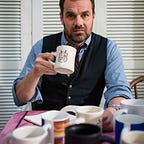The Importance of Nurturing Doubt in an Age of Righteousness
Fiction’s gift to us is the ability to live in the “land of ambiguity.”
8 min readFeb 13, 2019
I often remark that we’re living in “the Age of Certainty,” although perhaps the better moniker is “the Age of Righteousness.” The two go hand in hand.
